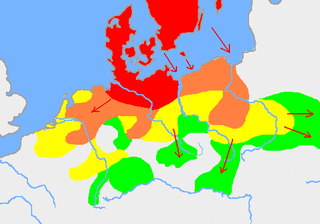日耳曼语族
印欧语系的分支 来自维基百科,自由的百科全书
日耳曼语族(英语:Germanic languages)是印欧语系下列的一个语言分支,现时全球有5.15亿人以各日耳曼语为母语[nb 1],主要分布于欧洲、北美洲、大洋洲及非洲南部。该语支分布最广泛的语言是英语,为全球20亿人所使用(L1及L2)。所有的日耳曼语言都来自铁器时代时期的斯堪的纳维亚原始日耳曼语。该语族下有两个现存分支:西日耳曼语支及北日耳曼语支。
西支最主要的语言为:
其他规模较大的西支语言还有:
- 南非荷兰语:710万母语者;
- 低地德语:30万母语,及670至700万人口能够理解[4][5],当中500万位于德国[6]及170万位于荷兰[7];
- 意地绪语:二战前为1,700万欧洲犹太人所用[8];
- 低地苏格兰语:130万使用人口;
- 林堡语:在荷兰、比利时及德国三国边界附近共有130万使用人口;
- 西弗利斯兰语:在德国及荷兰有50万使用人口。
而最主要的北日耳曼语言为丹麦语、挪威语及瑞典语,该三语能够高度互通,并且有2,000万左右的母语人口以及500万第二语言人口。但是中世纪开始,北支语言就受属于西支的低地德语影响极深。根据不同的研究,北支诸语有30%至60%的词汇来自低地德语。其他北支语言还有冰岛语和法罗语,两种语言都相当传统,并且受低地德语影响很少,但却正因此点而于其他姊妹语言不能保持互通,其文法亦明显被他者更复杂。[9]
而东日耳曼语支的语言则主要有哥特语、汪达尔语及勃艮第日耳曼语,但该语支的语言已经全部消亡。最迟灭绝的是18世纪晚期之前在克里米亚部分封闭地区使用的克里米亚哥特语。[10]
根据民族语,日耳曼语族一共有48种语言,其他41种为西支,另外6种为北支。而巴西的汉斯立克语则没有被分类为任何一个大分支,不过该语多数时候还是被语言学家认定为德语的一种方言。[11]对于历史上究竟有多少人曾经(及正在)使用日耳曼语,学界往往难下定论——该语族一些子语言(尤其是东日耳曼语)很多在民族大迁徙时期灭亡。但是亦有一些西支子语言在该时期灭绝,当中最为人所知的是伦巴第语。第二次世界大战之后,由于德国领土缩小及对德意志人口的驱逐,很多德语方言消亡。21世纪之后,由于标准德语的推广[12],幸存的德语方言亦陷入衰退[nb 3]。
所有日耳曼语族语言的共同祖先是原始日耳曼语,亦称共同日耳曼语。该语在公元前第一个千禧年中期的石器时期斯堪的纳维亚就已有人使用。原始日耳曼语及其子语言有很多独有的语言特征,当中最著名的要数格林定律下的辅音变化。随着公元前2世纪日耳曼部落开始从北欧南迁至今天的德国北部和丹麦南部,日耳曼人迈上了人类历史舞台。
现代世界中的地位
英语是全球55个主权国家及另外27个地区的官方语言(详见英语国家和地区列表),多数为英国在非洲、亚洲、大洋洲的前殖民地。英语同时亦是英国、澳大利亚及美国的实际官方语言。在尼加拉瓜[13]及马来西亚,英语享有政府承认的工作语言地位。美国英语是西支诸语中拥有最多母语人口的语言。
德语是奥地利、德国、列支敦士登、瑞士和卢森堡的官方语言,并且在义大利、丹麦及纳米比亚享有地区语言地位。在北美洲、南美洲、中美洲、墨西哥和澳大利亚,依然有部分移民使用德语。在美国,一种德语方言宾夕法尼亚德语,至今仍有人使用。
荷兰语是荷兰王国、苏里南和比利时的官方语言[14]。虽然荷兰曾经殖民过印度尼西亚,但荷兰语在印尼独立后便在该国销声匿迹,目前亦只有一些老年人或受过传统殖民教育的人士使用。在1984年以前,荷兰语一直是南非的官方语言,但后被南非荷兰语所取代,后者目前是南非11种官方语言之一,并且是纳米比亚的通用语。在其他非洲南部国家,亦有不少人使用南非荷兰语。
低地德语是一系列差异巨大方言集合体,主要流行于荷兰的东北部及德国的北部。
低地苏格兰语流通于苏格兰低地部分和阿尔斯特省部分区域,后者通常亦称阿尔斯特苏格兰语。[15]
菲士兰语有大约50万人使用,主要位于北海的南部海岸。
卢森堡语是一种莫泽河法兰克语,是卢森堡的国语及官方语言之一。[16]
意地绪语曾经是1,100万至1,300万人的母语,但是现在已经只有150万人使用,并分布于北美洲、欧洲、以色列等地的犹太人社区。[17]
瑞典语是瑞典和芬兰的官方语言,后者存在着大量的芬兰瑞典族(主要分布在该国的西、南海岸),并且在芬兰自治区奥兰群岛,瑞典语还享有唯一官方语言地位。爱沙尼亚亦有一些人使用瑞典语。
丹麦语是丹麦及法罗群岛(属丹麦的海外部分)的官方语言,同时亦是格陵兰岛的教学用语及通用语,丹麦语在2009年之前,亦一直是该岛的官方语言之一。德国的石勒苏益格-荷尔斯泰因亦有一些丹麦少数民族,该地区亦承认丹麦语的少数语言地位。
日耳曼语言的母语使用者饼状图:[nb 4]
英语(69.9%)
德语(19.4%)
荷兰语(4.5%)
南非荷兰语(1.4%)
其他德语变种(1%)
瑞典语(1.8%)
丹麦语(1.1%)
挪威语(1%)
其他日耳曼语(0.1%)
| 语言 | 母语使用者[nb 5] |
|---|---|
| 英语 (English) | 3.6亿至4亿[18] |
| 德语 (Deutsch) | 1亿[19][nb 6] |
| 荷兰语 (Nederlands) | 2,400万[20] |
| 瑞典语 (Svenska) | 1,110万[21] |
| 南非荷兰语 (Afrikaans) | 710万[22] |
| 丹麦语 (Dansk) | 550万[23] |
| 挪威语 (Norsk) | 530万[24] |
| 意地绪语 (ייִדיש) | 150万[25] |
| 低地苏格兰语 (Scots) | 150万[26] |
| 林堡语 (Lèmburgs) | 130万[27] |
| 菲士兰语 (Frysk/Noordfreesk/Seeltersk) | 50万[28] |
| 卢森堡语 (Lëtzebuergesch) | 40万[29] |
| 低地德语 (Platt/Neddersassch/Leegsaksies) | 30万[30] |
| 冰岛语 (Íslenska) | 30万[31] |
| 法罗语 (Føroyskt) | 7万[32] |
| 其余的日耳曼语及其变种 | 1万[nb 7] |
| 总数 | 5.15亿[nb 8] |
历史

公元前750年的分布
公元前500年的分布
公元前250年的分布
公元1世纪的分布

古西诺斯语
古东诺斯语
古哥特兰语
该语支所有语言都来自假想的原始日耳曼语,其下属语都经历了格林定律和维尔纳定律下的音素变化,并且其与原始印欧语的分化可能发生在公元前500年左右的铁器时期北欧。
之后原始日耳曼语就出现了北支、西支和东支三个分支,但是由于遗留现世的文献稀少,因此学界亦很难定义这三个分支的关系。
西支的分化可能出现亚斯托夫文化晚期,东支则在公元1世纪左右从哥得兰岛分化,最后瑞典南部则成为北支的发源地。在卢因字母的早期阶段(公元2世纪至4世纪),各语言可能仍处于共同日耳曼语时期。
目前保存最早的连贯日耳曼文献,是公元4世纪时期由乌尔菲拉翻译的新约哥特语译本。西日耳曼语的早期文献有:古法兰克语/古荷兰语的卢因文记录(公元5世纪);古高地德语在6世纪的零星句子和单词,并且在9世纪出现了连贯的文献;古英语在650年代出现了最早的文献记录,而连贯的书面记录则出现在10世纪。而北日耳曼语支则仅出现在零星的卢因文献记录中,并且在公元800年左右从原始斯诺语演变为古斯诺语。
更长的卢因字母文献可以追溯至公元8世纪到9世纪(参见英语条目Eggjum stone 和 Rök runestone),而拉丁字母书面文献则可追溯至12世纪。
大概在公元10世纪,各分支之间的差异已经大到再亦不能互通。有怀疑指出,随着盎格卢-撒克逊人与维京人的语言接触,古英语的语法架构亦因此崩塌,最终演化为中古英语。
东日耳曼语支在民族大迁移之后就处于边缘地位。勃艮第人、哥特人及汪达尔人亦纷纷于7世纪在语言上被其紧邻民族所同化,仅存的克里米亚哥特语亦于18世纪灭绝。
在中世纪早期,欧洲大陆高地德语子音推移发生,并且产生了上部德语及低地德语,而偏居岛屿的中古英语则开始了其独立的发展道路。直至现代早期,德语内部已经分裂为诸多方言,尤其是北面的北下萨克森语和南面的阿勒曼尼语,虽仍被认为是德语的方言,但是两者已经不能互通。南端的德语方言甚至发生了第二次音素推移,而北部的其他方言则没受影响。
北日耳曼语支则在公元11世纪之后都仍能保持互通,这种互通甚至一直保留到今天。北支内部主要的分支是位于大陆的东斯堪的纳维亚语支和位于岛屿的西斯堪的纳维亚语支。
书写
一些早期(约公元2世纪)的日耳曼语言发展出自己的卢恩字母(runic alphabet,北欧文字),但这些文字相对来说运用并不广泛。东日耳曼语支使用哥特字母,由乌斐拉主教将圣经译为哥特语时发展创立。其后,因为基督教神甫与僧侣既讲日耳曼语,也能够读说拉丁语,所以开始用稍加修饰的拉丁字母来书写日耳曼语言。
除去标准拉丁字母,各种日耳曼语言也使用一些标音符号和其他字母。其中包括元音变音(umlaut)、ß (Eszett)、 Ø、Æ、Å、Ð、Ȝ和从如尼文中继承下来的Þ及Ƿ。传统的印刷体德语经常用黑体字。
语言特征
日耳曼语族一些最明显的特征是:
- 遵循格林定律及维尔纳定律的辅音演变,例如原始的 */t d dʰ/ 在多数日耳曼语中演变为 */θ t d/ ;
- 重音转移到词语的第一个音节(或词根)上,导致大量的音节脱落。尽管英语的重音位置并不规则,但本语词源的单词重音经常是固定的,无论附加什么词缀。有人争论这点是最重要的变化。
- 日耳曼语元音变音;
- 出现了大量的元音。多数英语方言都有11-12个元音(不包双元音),标准瑞典语有17个单元音[33],标准德语和荷兰语有14个,丹麦语则至少有11个[34]。巴伐利亚语的阿姆施泰滕方言甚至就长元音就已经有13个,使其成为世界上拥有最多元音的语言之一。[35]
- 动词第二顺位现象;
其他一些重要的特征有:
- 将印欧语系的时态体系削减为过去时与现在时(或一般时)。
- 附加齿音后缀(/d/或/t/)来表示过去时态,而不用元音变换(印欧元音变换)。导致有两种动词变位:规则变位/弱变位(附加齿音后缀)与不规则变位/强变位(元音交替)。英语共有161个不规则动词/强动词,都属于英语本语辞源。
- 使用强形容词与弱形容词。近代英语的形容词一般不改变,除非用在比较级或最高级上。古英语中不同,依据前面是否有冠词或指示代词来变化形容词。
- 有一些词的词源与其他印欧语言很难产生联系,但这些词的变形体却岀现在几乎所有日耳曼语言中。
需要注意的是,部分上述特征并没有出现在原始日耳曼语中:
- 日耳曼语元音变音仅仅出现在西支和北支语言,在原始日耳曼语和东支则没有出现。
- 大量的元音是在后期才出现,原始日耳曼语仅有5个元音音位。
- 原始日耳曼语更有可能是主-宾-谓语序。动词第二顺位是在后期才出现。
但总言之,各日耳曼语的发展亦有保守和激进之分。例如冰岛语和德语依然保留着复杂的屈折变化,而英语、瑞典语和南非荷兰语则向分析语方向发展。
发展
一般认为所有的日耳曼语言都是从一个假设的原始日耳曼语发展而来。请注意,日耳曼语族下的分类很难准确定义;大多数都有渐变群的性质,邻近的方言互相能够交流,距离较远的则不能。
注释
参考文献
参考资料
外部链接
Wikiwand - on
Seamless Wikipedia browsing. On steroids.

